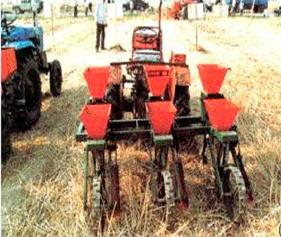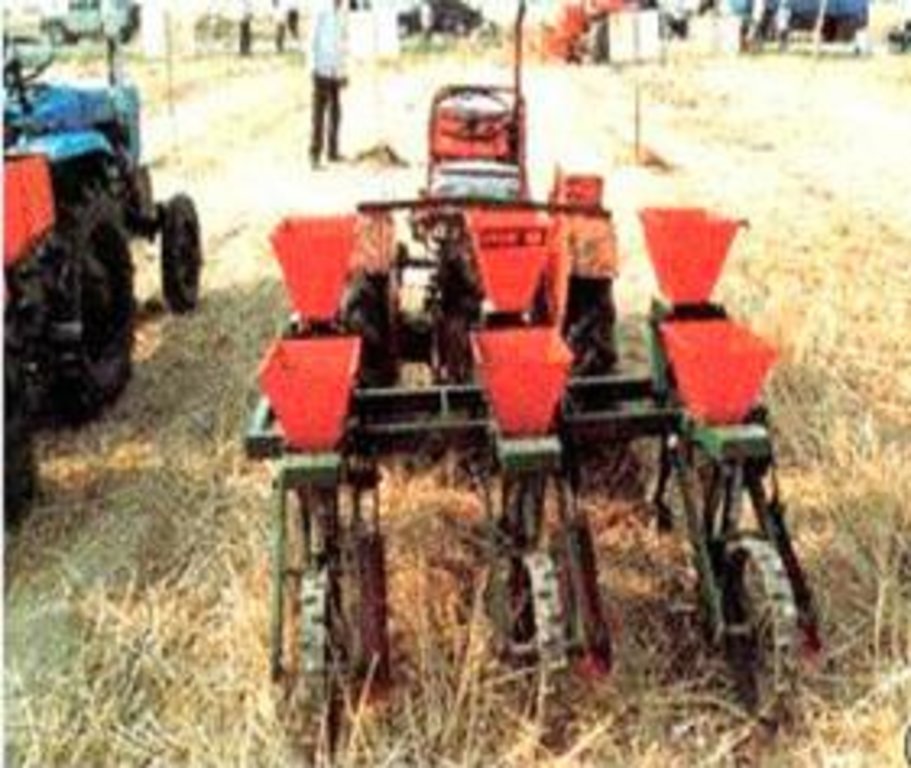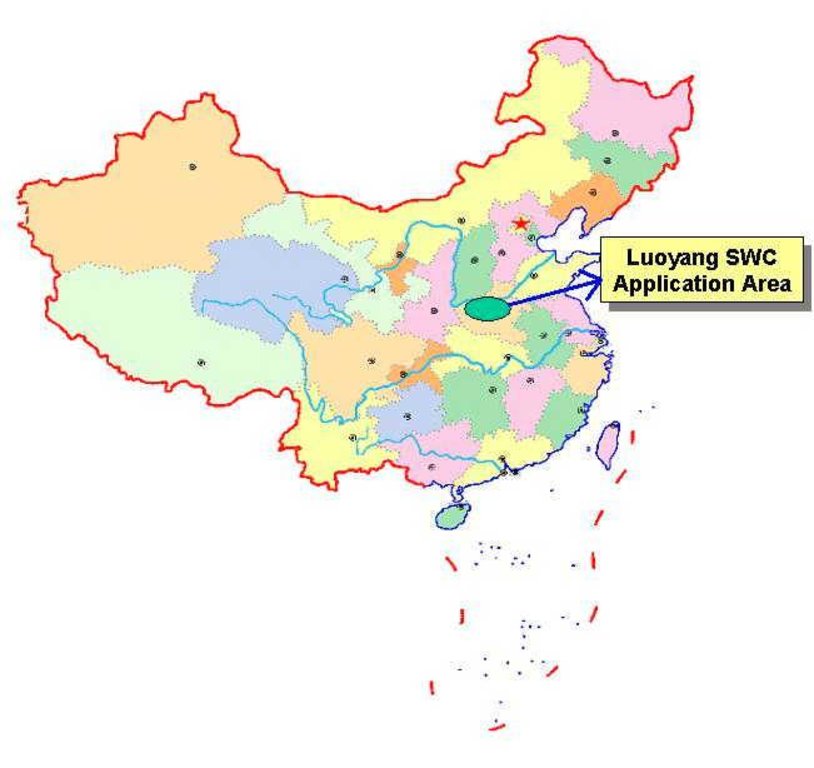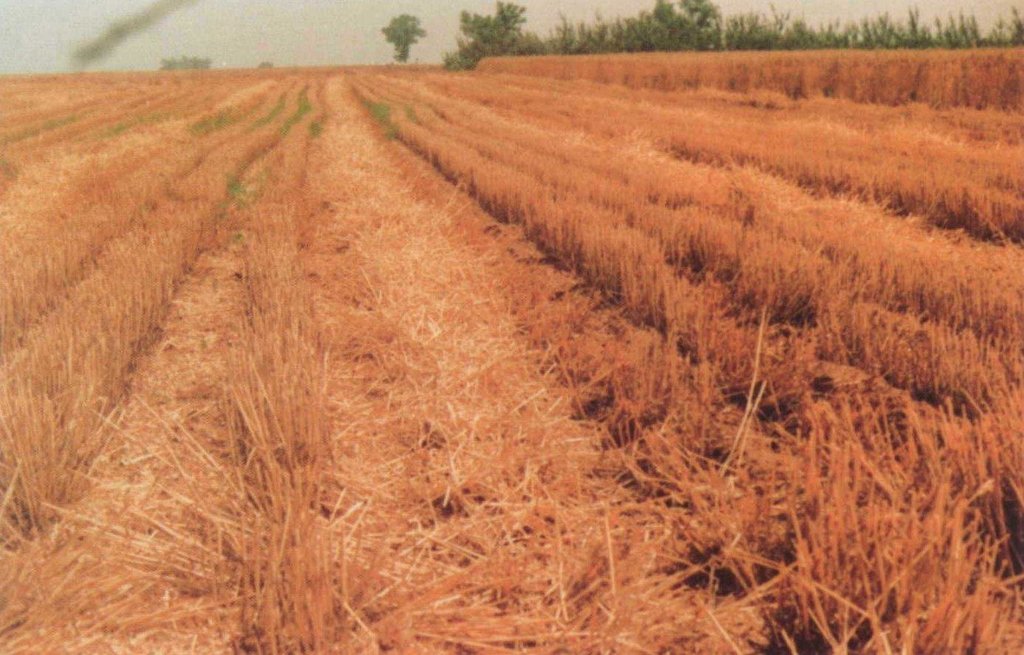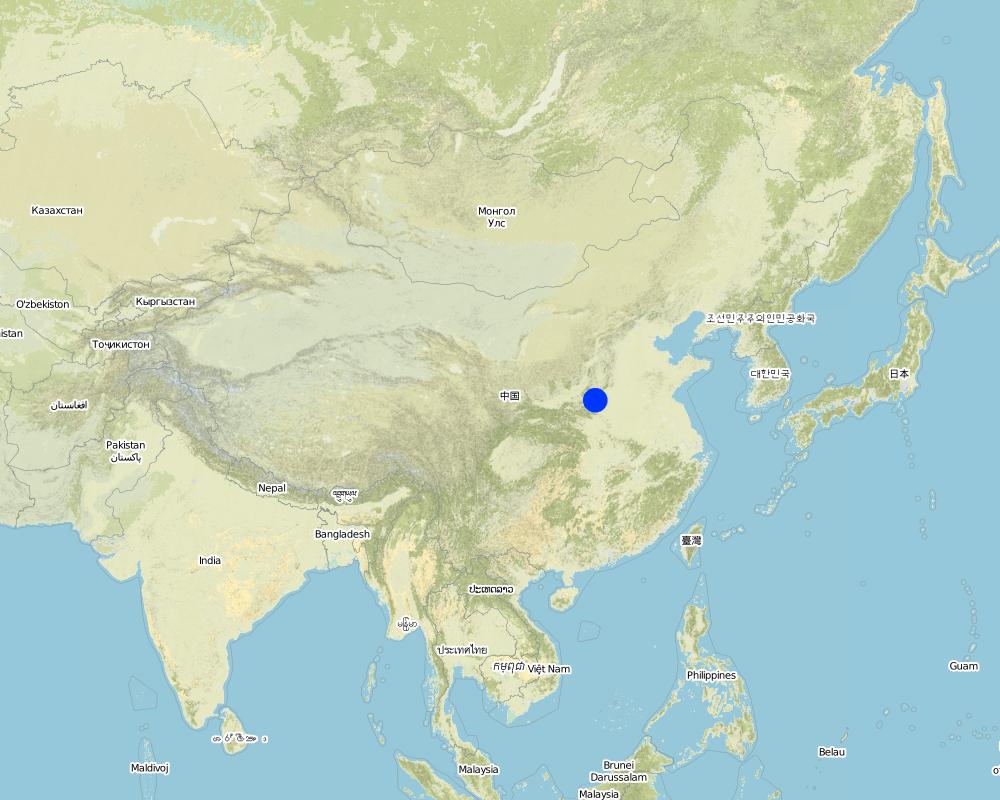Zero Tillage [China]
- Criação:
- Atualização:
- Compilador/a: Zhanguo Bai
- Editor: –
- Revisor: Laura Ebneter
approaches_2411 - China
Veja as seções
Expandir tudo Recolher tudo1. Informação geral
1.2 Detalhes do contato das pessoas capacitadas e instituições envolvidas na avaliação e documentação da abordagem
Especialista em GST:
Wang Deshui
(8610) 68918672
Institute of Soil & Fertilizer, Chinese Academy of Agricultural Sciences (CAAS)
12 zhong guan cun south street, Beijing 100081, P.R. of China
China
Nome da(s) instituição(ões) que facilitou(ram) a documentação/avaliação da Abordagem (se relevante)
Institute of Agricultural Resources and Regional Planning of Chinese Academy of Agricultural Sciences (CAAS) - China1.3 Condições em relação ao uso da informação documentada através de WOCAT
O/a compilador/a e a(s) pessoa(s) capacitada(s) aceitam as condições relativas ao uso de dados documentados através da WOCAT:
Sim
1.4 Referência ao(s) questionário(s) sobre tecnologias da GST
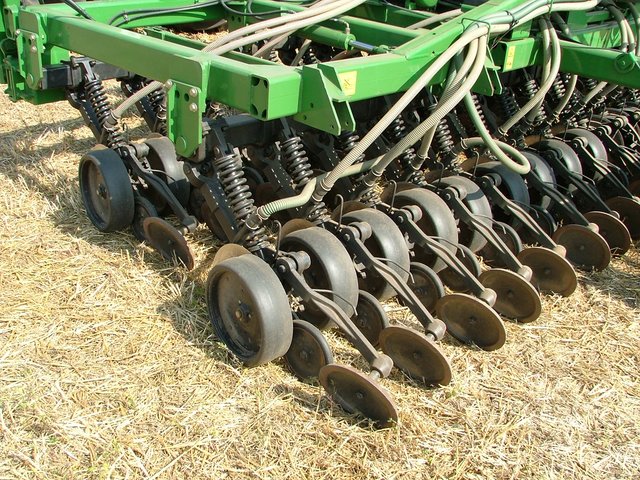
No-till agriculture [Hungria]
No-till agriculture replaces conventional soil tillage in order to reduce costs and labour - and to provide a mulch layer on the soil surface from the residues of the previous crop: this protects the soil surface and its ecology.
- Compilador/a: Brigitta Szabó
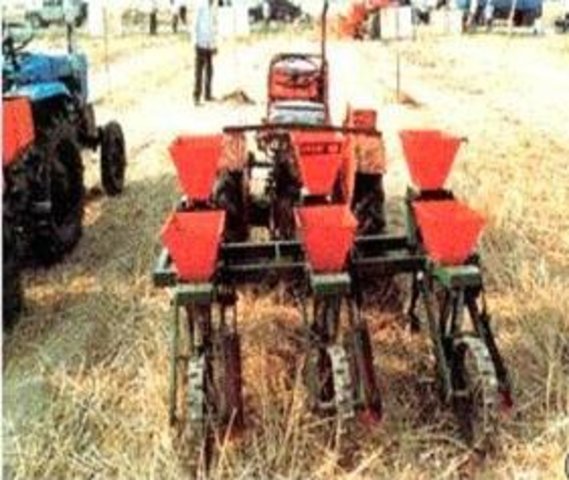
Zero Tillage [China]
Zero tillage technology was developed to protect the soils from sealing rainfall, to achieve and maintain a open internal soil structure, to enhance biological processes in the soil, and to develop a means for safe disposal of any surface runoff that nevertheless will occur.
- Compilador/a: Zhanguo Bai
2. Descrição da abordagem de GST
2.1 Descrição curta da abordagem
Zero tillage approach was developed to protect the soils from sealing rainfall, to achieve and maintain a open internal soil structure, to enhance biological processes in the soil, and to develop a means for safe disposal of any surface runoff that nevertheless will occur.
2.2 Descrição detalhada da abordagem
Descrição detalhada da abordagem:
Sustainable agriculture in the dry and semidry regions in the north China, especially on the slope farmland is searching always based on the ecological balance. Conservative tillage such as zero, reduced and subsoiling tillage are important to keep soil fertility. Mulching is also a way to improve the soil organic matter. So no tillage with mulching is an approach to do this. No tillage lets all rainfall in the soils and avoid runoff occur.
2.3 Fotos da abordagem
2.5 País/região/locais onde a abordagem foi aplicada
País:
China
Região/Estado/Província:
Henan province
Map
×2.6 Datas de início e término da abordagem
Indique o ano de início:
1995
Ano de término (caso a abordagem não seja mais aplicada):
2003
2.7 Tipo de abordagem
- Baseado em projeto/programa
2.8 Principais metas/objetivos da abordagem
The Approach focused mainly on SLM with other activities (Reduction of dust devil that occur in North China.)
The main objectives of the approach is to apply conservation tillage for sustainable agricultural development.
The SLM Approach addressed the following problems: Traditional tillage (multi-till) with little return of organic matters to soils results in soil fertility decline and nutrient loss as well as yield decrease. This approach is designed to change the traditional cultivation ways to conservation tillage.
2.9 Condição que propiciam ou inibem a implementação de tecnologia/tecnologias aplicada(s) segundo a abordagem
Disponibilidade/acesso a recursos e serviços financeiros
- Inibitivo
buying no till machine and tractor
Treatment through the SLM Approach: subsidy and adjust crop planting pattern
Quadro jurídico (posse de terra, direitos de uso da terra e da água)
- Propício
The existing land ownership, land use rights / water rights helped a little the approach implementation: Because land ownership belongs to state and land users can only lease land.
Conhecimento sobre GST, acesso a suporte técnico
- Inibitivo
organizing subdivided householders together
3. Participação e papel das partes interessadas envolvidas
3.1 Partes interessadas envolvidas na abordagem e seus papéis
- Usuários de terra/comunidades locais
Work equally divided between men and women (experimental areas selected on the basis of the landforms, contributed to diff, households). Householders organized by local committee or by implementation
- Especialistas em GST/ consultor agrícola
- Professores/alunos/estudantes
- Governo nacional (planejadores, responsáveis pelas decisões)
3.2 Envolvimento do usuários de terra/comunidades locais nas diferentes fases da abordagem
| Envolvimento do usuários de terra/comunidades locais | Especifique quem estava envolvido e descreva as atividades | |
|---|---|---|
| Iniciação/motivação | Passivo | Mainly:interviews/questionnaires; partly: public meetings; Generally local and/or village committee call land users who involved in the SWC project together and illustrate the purpose and obligation. |
| Planejamento | Apoio externo | rapid/participatory rural appraisal; Detailed planning are addressed to whose who take part in the activities. |
| Implementação | Participativo | responsibility for minor steps; Each step and procedures are guided and checked for implementation. |
| Monitoramento/avaliação | Passivo | measurements/observations; Mainly done by the researchers and local government staffs not by local land users. |
| Research | Participativo | on-station; The effect and impacts of the SWC technology on the soil and environment are investigated and studied on experimental station and on farm. |
3.4 Decisão sobre a seleção de tecnologia/tecnologias de GST
Especifique quem decidiu sobre a seleção de tecnologia/tecnologias a serem implementadas:
- Políticos/líderes
Explique:
Decisions on the choice of SLM Technology were made directive (top-down).
Decisions on the method of implementing the SLM Technology were made mainly by SLM specialists with consultation of land users.
4. Suporte técnico, reforço das capacidades e gestão do conhecimento
4.1 Reforço das capacidades/ formação
Foi oferecida formação aos usuários da terra/outras partes interessadas?
Sim
Especifique quem foi capacitado:
- Usuários de terra
- SWC specialists, extensionists/trainers
Tipo de formação:
- Agricultor para agricultor
- Áreas de demonstração
- Reuniões públicas
- Cursos
Assuntos abordados:
Teaching them how to operate tractor/tillage with mulching residuals and fertilizing as well as seeding; to understand the importance of the roles of the SWC etc.
4.2 Serviço de consultoria
Os usuários de terra têm acesso a um serviço de consultoria?
Sim
Especifique se foi oferecido serviço de consultoria:
- nas áreas dos usuários da terra
Descreva/comentários:
Name of method used for advisory service: In situ demonstration and training; Key elements: Demonstration, Training, farmer visit; 1) Advisory service was carried out through: government's existing extension system, projects own extension structure and agents 2) Advisory service was carried out through: government's existing extension system, projects own extension structure and agents; Extension staff: mainly government employees 3) Target groups for extension: land users; Activities: Demonstration, training
Advisory service is quite adequate to ensure the continuation of land conservation activities; Top-down agricultural/SWC technology extension service system has been established at variable government levels, they have capability of extension all kinds of the new techniques.
4.3 Fortalecimento da instituição (desenvolvimento organizacional)
As instituições foram fortalecidas ou estabelecidas através da abordagem?
- Sim, significativamente
Especifique a que nível (níveis) as instituições foram fortalecidas ou estabelecidas:
- Local
Especifique o tipo de apoio:
- Financeiro
- Reforço das capacidades/ formação
- Equipamento
4.4 Monitoramento e avaliação
Monitoramento e avaliação são partes da abordagem?
Sim
Comentários:
bio-physical aspects were regular monitored through measurements
technical aspects were regular monitored through measurements
land users involved aspects were regular monitored through observations
There were few changes in the Approach as a result of monitoring and evaluation
4.5 Pesquisa
A pesquisa foi parte da abordagem?
Sim
Especifique os tópicos:
- Ecologia
- Tecnologia
Dê mais detalhes e indique quem realizou a pesquisa:
The successful results of the SWC study obtained by the SWC approach are widely applied to the control of the dust devil, and ecological recover. Research was carried out both on station and on-farm
5. Financiamento e apoio material externo
5.1 Orçamento anual para o componente de GST da abordagem
Caso o orçamento exato seja desconhecido, indique a faixa:
- 100.000-1.000.000
Comentários (p. ex. principais fontes de recursos/principais doadores):
Approach costs were met by the following donors: local community / land user(s) (National - Central government): 30.0%; government: 60.0%; international: 5.0%; other: 5.0%
5.3 Subsídios para entradas específicas (incluindo mão-de-obra)
- Equipamento
| Especifique quais entradas foram subsidiadas | Em que medida | Especifique os subsídios |
|---|---|---|
| Maquinário | Parcialmente financiado | |
- Agrícola
| Especifique quais entradas foram subsidiadas | Em que medida | Especifique os subsídios |
|---|---|---|
| Fertilizantes | Parcialmente financiado | |
- Infraestrutura
| Especifique quais entradas foram subsidiadas | Em que medida | Especifique os subsídios |
|---|---|---|
| community infrastructure | Parcialmente financiado | |
Se a mão-de-obra pelos usuários da terra foi uma entrada substancial, isso foi:
- Voluntário
Comentários:
Labour was voluntary, paid in cash and rewarded with other material support.
In the past (before 1980's), SWC activities are mainly done by community members through obligation. Nowadays under the conditions of economic market, people unwill to do this voluntary, they concern return of their input for SWC.
5.4 Crédito
Foi concedido crédito segundo a abordagem para atividades de GST?
Sim
Especifique as condições (taxa de juros, reembolso, etc):
Interest rate charged: 2.3%; repayment conditions: After 2 to 5 years when SWC produces benefits, loaner should repay.
Interest was lower than market rate.
6. Análise de impactos e declarações finais
6.1 Impactos da abordagem
A abordagem auxiliou os usuários da terra a implementar e manter as tecnologias de GST?
- Não
- Sim, pouco
- Sim, moderadamente
- Sim, significativamente
Soil & water loss reduced much and soil fertility is greatly improved with increase in yield.
A abordagem melhorou as questões de posse de terra/diretos do usuário que inibiam a implementação das tecnologias de GST?
- Não
- Sim, pouco
- Sim, moderadamente
- Sim, significativamente
Subdivision and lease of the land would hinder SWC implementation. The problem is likely to be overcome in the near future. Farmers worry that their land would transfer to others, well organizing could reduce the negative impact through prolong the lease period of land use.
Did other land users / projects adopt the Approach?
- Não
- Sim, pouco
- Sim, moderadamente
- Sim, significativamente
6.3 Atividades de sustentabilidade de abordagem
Os usuários da terra podem manter o que foi implementado através da abordagem (sem apoio externo)?
- Sim
6.4 Pontos fortes/vantagens da abordagem
| Pontos fortes/vantagens/oportunidades na visão do usuário da terra |
|---|
| Raising yield and soil moisture as well as fertility. (How to sustain/ enhance this strength: Leaving high residual straw and cover soil surface.) |
| Pontos fortes/vantagens/oportunidades na visão do/a compilador/a ou de outra pessoa capacitada |
|---|
| Practical (How to sustain/ enhance this strength: Financial support from various government) |
| Very welcome by farmers. Great economic and ecological benefits (How to sustain/ enhance this strength: enlarging extension) |
6.5 Pontos fracos, desvantagens da tecnologia e formas de superá-los
| Pontos fracos/desvantagens/riscos na visão do usuário da terra | Como eles podem ser superados? |
|---|---|
| Shortage of finance | Raising money |
| Pontos fracos/vantagens/riscos na visão do/a compilador/a ou de outra pessoa capacitada | Como eles podem ser superados? |
|---|---|
| Hard to widely extension due to expensive tillage machinery | Government should financially support |
7. Referências e links
7.1 Métodos/fontes de informação
- visitas de campo, pesquisas de campo
- entrevistas com usuários de terras
7.2 Referências às publicações disponíveis
Título, autor, ano, ISBN:
Report of ninth-Five plan project on Dryland Farming, Jan 2002,
Disponível de onde? Custos?
internal reference
Título, autor, ano, ISBN:
Introduction of Luoayng physicography
Disponível de onde? Custos?
unpublished materials
Título, autor, ano, ISBN:
No-till farming for sustainable rural development, 2002
Disponível de onde? Custos?
World Bank
Título, autor, ano, ISBN:
A road map from conventional to no-till farming, 2002
Disponível de onde? Custos?
World Bank
Título, autor, ano, ISBN:
Conservation agriculture, 2001
Disponível de onde? Custos?
FAO
Links e módulos
Expandir tudo Recolher tudoLinks

No-till agriculture [Hungria]
No-till agriculture replaces conventional soil tillage in order to reduce costs and labour - and to provide a mulch layer on the soil surface from the residues of the previous crop: this protects the soil surface and its ecology.
- Compilador/a: Brigitta Szabó

Zero Tillage [China]
Zero tillage technology was developed to protect the soils from sealing rainfall, to achieve and maintain a open internal soil structure, to enhance biological processes in the soil, and to develop a means for safe disposal of any surface runoff that nevertheless will occur.
- Compilador/a: Zhanguo Bai
Módulos
Não há módulos


